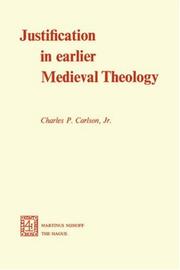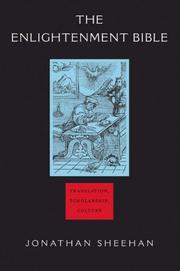| Listing 1 - 6 of 6 |
Sort by
|
Book
ISBN: 3525032544 Year: 1980 Publisher: Göttingen Vandenhoeck und Ruprecht
Abstract | Keywords | Export | Availability | Bookmark
 Loading...
Loading...Choose an application
- Reference Manager
- EndNote
- RefWorks (Direct export to RefWorks)

ISBN: 9024717094 9401016534 Year: 1975 Publisher: The Hague Nijhoff
Abstract | Keywords | Export | Availability | Bookmark
 Loading...
Loading...Choose an application
- Reference Manager
- EndNote
- RefWorks (Direct export to RefWorks)
234.12 --- Justification (Christian theology) --- -#GROL:SEMI-234.12 --- #GGSB: Dogmatiek --- #GGSB: Genade(leer) --- #GGSB: Schepping --- #GGSB: Dogma- en theologiegeschiedenis --- Heiligmakende genade:--bovennatuurlijk wezen; verwerving --- History of doctrines --- 234.12 Heiligmakende genade:--bovennatuurlijk wezen; verwerving --- #GROL:SEMI-234.12 --- Faith and justification --- Justification --- Justification by faith --- Salvation --- Christianity --- Dogma- en theologiegeschiedenis --- Dogmatiek --- Genade(leer) --- Schepping --- Histoire des doctrines --- Justification (théologie)
Book
ISBN: 2204017876 9782204017879 Year: 1982 Volume: 111 Publisher: Paris Cerf
Abstract | Keywords | Export | Availability | Bookmark
 Loading...
Loading...Choose an application
- Reference Manager
- EndNote
- RefWorks (Direct export to RefWorks)
Justification --- Biblical teaching --- Enseignement biblique --- Bible. --- Criticism, interpretation, etc --- Critique, interprétation, etc --- Justification (Christian theology) --- Biblical teaching. --- Bible --- #GGSB: Dogmatiek --- #GGSB: Genade(leer) --- 227.1*3 --- -#GOSA:I.NT.Gal.M --- Brief van Paulus aan de Galaten --- 227.1*3 Brief van Paulus aan de Galaten --- Critique, interprétation, etc --- #GOSA:I.NT.Gal.M --- Epistles of Paul --- Paul, Epistles of --- Paul Sŏsin --- Pauline epistles --- Risālat al-Qiddīs Būlus al-rasūl al-thāniyah ilá Tīmūthīʼūs --- Criticism, interpretation, etc. --- Dogmatiek --- Genade(leer) --- Justification (Christian theology) - Biblical teaching
Book
ISBN: 0521308879 052132274X 9780521308878 9780521322744 0521379733 0521448468 Year: 1993 Publisher: Cambridge Cambridge University press
Abstract | Keywords | Export | Availability | Bookmark
 Loading...
Loading...Choose an application
- Reference Manager
- EndNote
- RefWorks (Direct export to RefWorks)
Volume I documents the development of the doctrine of justification from its earliest period to the eve of the Reformation. The work opens with an analysis of the semantic background of the concept in the world of the Ancient Near East, and particular attention is paid to the difficulties of translating the concept into Greek and Latin, After this the early development of the doctrine is considered, with particular reference to Augustine of Hippo. In a later chapter, the main features of the doctrine of justification associated with the five principal theological schools of the medieval period are established. The continuity between the later medieval period and the Reformation is discussed in a final chapter. The work includes a glossary of relevant theological terms for those not already familiar with the vocabulary of the period. Volume II documents developments from the Reformation to the present day. Lutheran and Reformed concepts are considered together with the teaching of the Council of Trent. English reformers are compared with continental counterparts; and the development of the doctrine within Anglicanism is studied with reference to Caroline divines and John Henry Newman. Modern development since the Enlightenment is considered with particular reference to Kant, Schleiermacher, Ritschl and Barth. There has been no comparable study since Ritschl's three-volume Christliche Lebre von der Rechfertigung und Vershnung of 1870.
Justification (Christian theology) --- History of doctrines --- -234.122 --- #GGSB: Dogmatiek --- 234.22 --- #GGSB: Genade(leer) --- #GGSB: Schepping --- #GGSB: Dogma- en theologiegeschiedenis --- Wijze van rechtvaardiging: geloof of goede werken. Solifidianisme. Osiandrisme. Inroepen van de verdiensten van Christus --- Kairos. Bekering. Metanoia. Noodzakelijkheid van het geloof --- History of doctrines. --- 234.22 Kairos. Bekering. Metanoia. Noodzakelijkheid van het geloof --- 234.122 Wijze van rechtvaardiging: geloof of goede werken. Solifidianisme. Osiandrisme. Inroepen van de verdiensten van Christus --- Dogmatiek --- Genade(leer) --- Schepping --- Dogma- en theologiegeschiedenis --- Justification (Christian theology) - History of doctrines --- Justification (théologie) --- Histoire des doctrines. --- #GOSA:II.P.AU.3 --- #GOSA:II.P.AU.4 --- #GOSA:III.Gen.M --- Christian dogmatics --- anno 500-1499 --- -History of doctrines
Book
ISBN: 3451021803 9783451021800 Year: 1999 Volume: 180 Publisher: Freiburg Herder
Abstract | Keywords | Export | Availability | Bookmark
 Loading...
Loading...Choose an application
- Reference Manager
- EndNote
- RefWorks (Direct export to RefWorks)
Ecclesiology --- Justification (Christian theology) --- Biblical teaching. --- 28*082.3 --- 234.121 --- -#GOSA:I.NT.Alg.M --- #GOSA:I.OT.Alg.M --- #GOSA:I.NT.Pa.M --- #GOSA:III.Oec.M --- #GGSB: Dogmatiek --- #GGSB: Schepping --- Oecumenische discussies tussen katholieken en protestanten --- Rechtvaardiging. Dispositie voor de rechtvaardiging. Geloof alleen volstaat niet --- Biblical teaching --- 234.121 Rechtvaardiging. Dispositie voor de rechtvaardiging. Geloof alleen volstaat niet --- 28*082.3 Oecumenische discussies tussen katholieken en protestanten --- #GOSA:I.NT.Alg.M --- Bible. --- Epistles of Paul --- Paul, Epistles of --- Paul Sŏsin --- Pauline epistles --- Risālat al-Qiddīs Būlus al-rasūl al-thāniyah ilá Tīmūthīʼūs --- Theology. --- Dogmatiek --- Schepping --- Justification (Christian theology) - Biblical teaching.

ISBN: 9780691130699 0691130698 0691118876 1400847796 9781400847792 9780691118871 Year: 2005 Publisher: Princeton Princeton university press
Abstract | Keywords | Export | Availability | Bookmark
 Loading...
Loading...Choose an application
- Reference Manager
- EndNote
- RefWorks (Direct export to RefWorks)
How did the Bible survive the Enlightenment? In this book, Jonathan Sheehan shows how Protestant translators and scholars in the eighteenth century transformed the Bible from a book justified by theology to one justified by culture. In doing so, the Bible was made into the cornerstone of Western heritage and invested with meaning, authority, and significance even for a secular age. The Enlightenment Bible offers a new history of the Bible in the century of its greatest crisis and, in turn, a new vision of this century and its effects on religion. Although the Enlightenment has long symbolized the corrosive effects of modernity on religion, Sheehan shows how the Bible survived, and even thrived in this cradle of ostensible secularization. Indeed, in eighteenth-century Protestant Europe, biblical scholarship and translation became more vigorous and culturally significant than at any time since the Reformation. From across the theological spectrum, European scholars--especially German and English--exerted tremendous energies to rejuvenate the Bible, reinterpret its meaning, and reinvest it with new authority. Poets, pedagogues, philosophers, literary critics, philologists, and historians together built a post-theological Bible, a monument for a new religious era. These literati forged the Bible into a cultural text, transforming the theological core of the Judeo-Christian tradition. In the end, the Enlightenment gave the Bible the power to endure the corrosive effects of modernity, not as a theological text but as the foundation of Western culture.
Enlightenment.
---
Siècle des lumières
---
Bible.
---
History.
---
-Enlightenment.
---
Aufklärung
---
Eighteenth century
---
Philosophy, Modern
---
Rationalism
---
Bible
---
History
---
Enlightenment
---
#GGSB: Exegese
---
22.06 <09>
---
Bijbel: exegese--
| Listing 1 - 6 of 6 |
Sort by
|

 Search
Search Feedback
Feedback About UniCat
About UniCat  Help
Help News
News